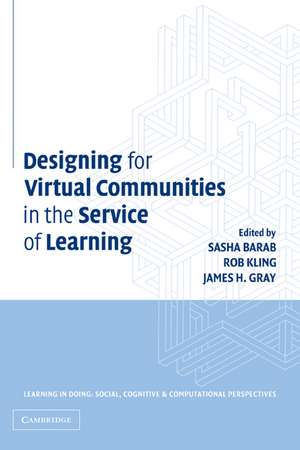Designing for Virtual Communities in the Service of Learning: Learning in Doing: Social, Cognitive and Computational Perspectives
Editat de Sasha Barab, Rob Kling, James H. Grayen Limba Engleză Paperback – 28 mar 2004
| Toate formatele și edițiile | Preț | Express |
|---|---|---|
| Paperback (1) | 332.97 lei 43-57 zile | |
| Cambridge University Press – 28 mar 2004 | 332.97 lei 43-57 zile | |
| Hardback (1) | 651.60 lei 43-57 zile | |
| Cambridge University Press – 28 mar 2004 | 651.60 lei 43-57 zile |
Din seria Learning in Doing: Social, Cognitive and Computational Perspectives
-
 Preț: 311.66 lei
Preț: 311.66 lei - 9%
 Preț: 695.96 lei
Preț: 695.96 lei -
 Preț: 319.43 lei
Preț: 319.43 lei -
 Preț: 228.66 lei
Preț: 228.66 lei -
 Preț: 201.39 lei
Preț: 201.39 lei - 11%
 Preț: 493.04 lei
Preț: 493.04 lei -
 Preț: 281.88 lei
Preț: 281.88 lei -
 Preț: 431.40 lei
Preț: 431.40 lei - 14%
 Preț: 900.82 lei
Preț: 900.82 lei -
 Preț: 326.53 lei
Preț: 326.53 lei -
 Preț: 346.50 lei
Preț: 346.50 lei -
 Preț: 296.65 lei
Preț: 296.65 lei -
 Preț: 292.45 lei
Preț: 292.45 lei - 20%
 Preț: 279.91 lei
Preț: 279.91 lei - 11%
 Preț: 459.10 lei
Preț: 459.10 lei -
 Preț: 357.13 lei
Preț: 357.13 lei - 11%
 Preț: 526.58 lei
Preț: 526.58 lei - 14%
 Preț: 784.65 lei
Preț: 784.65 lei -
 Preț: 320.66 lei
Preț: 320.66 lei - 11%
 Preț: 512.98 lei
Preț: 512.98 lei - 11%
 Preț: 690.80 lei
Preț: 690.80 lei - 11%
 Preț: 444.70 lei
Preț: 444.70 lei -
 Preț: 324.15 lei
Preț: 324.15 lei -
 Preț: 350.97 lei
Preț: 350.97 lei -
 Preț: 392.00 lei
Preț: 392.00 lei - 20%
 Preț: 516.51 lei
Preț: 516.51 lei -
 Preț: 330.33 lei
Preț: 330.33 lei - 14%
 Preț: 786.15 lei
Preț: 786.15 lei - 5%
 Preț: 321.87 lei
Preț: 321.87 lei -
 Preț: 350.21 lei
Preț: 350.21 lei -
 Preț: 321.27 lei
Preț: 321.27 lei - 14%
 Preț: 726.60 lei
Preț: 726.60 lei -
 Preț: 339.96 lei
Preț: 339.96 lei
Preț: 332.97 lei
Nou
Puncte Express: 499
Preț estimativ în valută:
63.71€ • 66.70$ • 52.72£
63.71€ • 66.70$ • 52.72£
Carte tipărită la comandă
Livrare economică 07-21 aprilie
Preluare comenzi: 021 569.72.76
Specificații
ISBN-13: 9780521520812
ISBN-10: 0521520819
Pagini: 480
Ilustrații: 35 b/w illus. 36 tables
Dimensiuni: 152 x 229 x 27 mm
Greutate: 0.63 kg
Ediția:New.
Editura: Cambridge University Press
Colecția Cambridge University Press
Seria Learning in Doing: Social, Cognitive and Computational Perspectives
Locul publicării:New York, United States
ISBN-10: 0521520819
Pagini: 480
Ilustrații: 35 b/w illus. 36 tables
Dimensiuni: 152 x 229 x 27 mm
Greutate: 0.63 kg
Ediția:New.
Editura: Cambridge University Press
Colecția Cambridge University Press
Seria Learning in Doing: Social, Cognitive and Computational Perspectives
Locul publicării:New York, United States
Cuprins
Part I. Coming To Terms With Community: 1. Introduction: designing for virtual communities in the service of learning Sasha Barab, Rob Kling and James Gray; 2. Models of community learning and online learning in communities Margaret Riel and Linda Polin; Part II. Designing for Web-supported Community: 3. Designing system dualities: building online community Sasha Barab, James MaKinster and Rebecca Scheckler; 4. Characterizing collective behavior online: the social organization of hangouts, clubs, associations, teams and communities Rob Kling and Christina Courtright; 5. Online teacher communities: technology snake-oil or powerful catalysts for professional development? Mark Schlager and Judi Fucso; 6. Community of practice a metaphor for online design? Thomas Schwen; Part III. Characterizing Community/Member Participation: 7. Autonomy, interaction and knowledge-building as bases for learning at the math forum Ann Renninger; 8. An exploration of community in a knowledge forum classroom: an activity system analysis Jim Hewitt; 9. Co-evolution of technological design and pedagogy in an online learning community Amy Bruckman; 10. From ambitious vision to partially satisfying reality: an evolving socio-technical design supporting community and collaborative learning in teaching education Sharon Derry, Julia Lee, Jong-Baeg Kim and Jennifer Seymour; Part IV. Researching Online Community: 11. Using social network analysis to study online learning communities Emmanuel Koku and Barry Wellman; 12. Computer-mediated discourse analysis: an approach to researching online communities Susan Herring; 13. Shared 'we' and shared 'they' indicators of group identity in online teacher professional development Kirk Sluder and Sasha Barab; 14. Sociocultural analysis of online professional development: a case study of personal, interpersonal, and community aspects James Gray and Deborah Tatar.
Recenzii
"Anyone designing, evaluating, or forming a community of learners will benefit from the examples and results reported in this volume." - Marcia C. Linn, University of California, Berkeley
Descriere
This 2004 volume explores the theoretical, design, learning, and methodological questions of designing and researching web-based communities.










